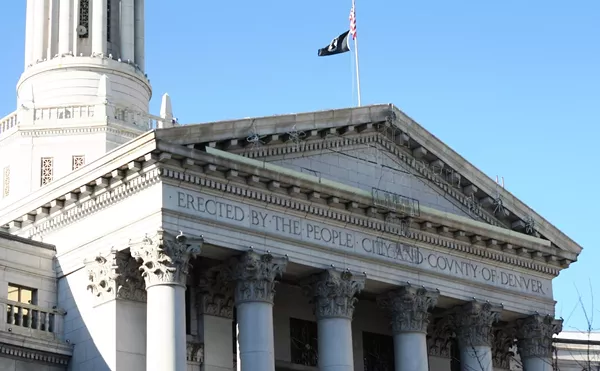Q: What's the difference between your neighborhood McDonald's and a Clear Channel radio station?
A: The voice behind the microphone at the McDonald's is live and local.
Thank you very much, ladies and gentlemen -- and don't forget to tip your waitress!
Gags like this aren't likely to get anyone at Clear Channel too upset, nor should they. But neither are such jabs wholly insignificant. Simply put, Clear Channel has ballooned so astoundingly -- and, critics say, behaved so dubiously -- that it's drawing fire from plenty of folks other than amateur comedians. Last summer, Nobody in Particular Presents, a local concert-promotion firm, charged the conglomerate with a number of "unlawful and anti-competitive practices" in a still-pending lawsuit filed in U.S. District Court ("Taking on the Empire," August 23, 2001). Since then, numerous politicians have expanded upon this theme and questioned whether Clear Channel's purchase of SFX (now Clear Channel Concerts), the country's pre-eminent presenter of live events, creates unfair, potentially illicit business advantages. And the murky financial relationships between independent radio promoters -- who largely control what songs are heard on commercial outlets -- and stations controlled by Clear Channel and its rivals are also receiving increased scrutiny.
In January, Representative Howard Berman, a California Democrat, wrote a letter to Attorney General John Ashcroft and Michael Powell, chairman of the Federal Communications Commission, in which he cited allegations that consolidation by Clear Channel "has negatively affected recording artists, owners of sound-recording copyrights, consumers, advertisers, and competitors in the radio and television industries." Representatives Rick Boucher and John Conyers, Democrats from Virginia and Michigan, respectively, have raised similar concerns. And Senator Russ Feingold, a Democrat from Wisconsin, is reportedly readying legislation that could potentially limit provisions in the Telecommunications Act of 1996 -- which allowed Clear Channel to mushroom in the first place -- and severely curtail the controversial tactics of indie promoters ("Playola," October 18, 2001).
Against this backdrop, Clear Channel tried to purchase House of Blues, pretty much the only concert promoter with a sizable national profile that it hadn't already swallowed. Back in 1999, SFX made a bid for Universal Concerts, which House of Blues later bought, but the merger never happened, partly because the U.S. Justice Department was sniffing around ("Peace and Love, Nineties Style," May 20, 1999). Of course, this took place during the Bill Clinton administration, and since George W. Bush has a more business-friendly reputation and is a buddy of chief executive officer Lowry Mays, Clear Channel types clearly felt Justice would be more receptive the second time around. But as reported on May 14 by the Rocky Mountain News's Mark Brown, who led the pack on this story, envoys from the department felt a proposed transaction violated antitrust laws, prompting the deal to collapse.
These governmental rumblings help explain the motivation behind correspondence sent to management-level Clear Channel employees late last month. According to a piece by media scribe Robert Feder that appeared in the May 29 Chicago Sun-Times, CEO Mays announced in the missive that the company was establishing a political action committee. PACs, as such entities are known, allow corporations and other groups to reward favored elected officials and candidates with contributions of as much as $5,000 per election, as well as to finance assorted fundraising and lobbying pursuits via the use of so-called "soft money."
"We have seen the need to have influence and impact on legislative issues in Washington, as well as at state and local levels," Mays wrote. "This becomes important particularly as Clear Channel grows. It is critical to tell our story and defend our positions."
And how does Clear Channel plan to pay for the PAC? Mays didn't spell out the specifics, but the letter was accompanied by a "membership application" suggesting that addressees tithe up to 1 percent of their annual salaries to the cause. (Those who choose not to comply have been assured that no one would be punished for failure to do so.) Presumably Mays will be among those to pony up, and he can certainly afford it. AdAge.com lists his compensation for calendar year 2000 at $4.179 million, including a base salary of $1 million and a $3 million bonus. Even though the San Antonio Express-News says his pay in 2001 was less than half that amount (approximately $1.16 million), owing to a downturn in Clear Channel's profitability, he probably hasn't had to lay off any housekeepers.
Budgeting contributions to the new PAC shouldn't be difficult, since Mays has been making regular donations to candidates and political parties for years. The Center for Responsive Politics, at www.opensecrets.org, documents thousands of dollars contributed by Lowry Mays and Clear Channel president Mark Mays, his son, during the last year or so; checks have gone to candidates and organizations such as the Outdoor Advertising Association of America. Clear Channel itself has been even busier: The Federal Election Commission Web site, www.fec.gov, lists $156,000 in contributions by the company since June 2000, with the lion's share going to the Republican National Committee.
Even so, the launch of Clear Channel's own PAC represents a noteworthy ratcheting up of political activity, and one that Diane Warren, vice president of communications for Clear Channel Worldwide, thinks may be overdue. "We are one of many Fortune 500 companies to have a political action committee," says Warren, who denies that the PAC was conceived in response to any specific legislation. "And many of the companies in our industry have them, too. In fact, we're probably a little bit behind the curve on starting one. But the size and diversity of our division, in Lowry's opinion, makes it the perfect time to start this initiative."
Lee Larsen concurs. The vice president and general manager of Clear Channel-Denver, which encompasses eight local stations (KOA, KHOW, KBCO, KBPI, KTCL, KISS-FM, the Fox and the Zone), sees the PAC as a logical step in the operation's development. "It's very typical of these companies," he points out. "When I worked at ABC, they had one. Disney has one; Viacom has one, and we also have one through the National Association of Broadcasters. And since the company can't technically raise its own funds, the only way they can have a PAC is by having voluntary employee contributions."
Neither the PAC nor the letter sent to managers such as himself has provoked much chat in the Denver cluster, Larsen says, and he's just as uninterested in statements attributed to lawmakers like Berman and Feingold: "I really don't pay very much attention to them. To me, it's all just political noise." But, he adds, it "absolutely makes sense to start a PAC. We're like Wal-Mart and Microsoft. We're a popular target for people to shoot at. And the PAC allows us to participate in the process."
Kicking ash: Out-of-state media types spent much of last week implying that the Hayman fire was so close to Denver that the average local could barbecue a weenie by shoving it onto a stick and holding it out his window. It's perfectly understandable that the networks would use Denver as a reference point for the inferno's progress, but wholly irresponsible of them to leave out the distance between the blaze's perimeter and the communities that are truly part of the metropolitan area -- and such omissions occurred regularly. At one point, CNN proclaimed that "the out-of-control wildfire is knocking at the door of the Mile High City's southern suburbs."
If it happens again, don't answer.
Two factors eventually caused this situation to improve: the impressive efforts of a veritable firefighting army, which dramatically slowed the blaze's growth closest to Denver, and the arrest of U.S. Forest Service technician Terry Barton for starting the conflagration in the first place -- an unexpected, soap-operatic twist that took center stage this week. As a result, the national press's interest in the story is already shifting and will eventually diminish unless Denver is threatened again -- and a lesser strain of the same malady seems to be afflicting area outlets, too. The Rocky Mountain News's June 13 banner, "Fire Could Burn For 90 Days," laid out the long-term commitment that will be required of area outlets interested in complete coverage. But while the Denver Post's Michael Booth placed this same prediction in the lead paragraph of his front-page roundup that same day, the paper's headline writers slapped on the bored-sounding label "Hayman Forges On," implying in the process that they already found such articles redundant.
Will the state's media fiddle while Colorado burns? There's no telling -- but even without striking new developments, the story still needs to be told. And Denver-based journalists are in the best position to tell it.
Luber-cation: KOA, the Denver radio station with the most-sizable news operation, started pulling back on its Hayman fire coverage before the blaze was even ten percent contained, focusing on brief updates on the hour and half-hour outside of its a.m. drive show, Colorado Morning News. Fortunately, these segments were generally useful, thanks in large part to the work of helicopter reporter Jayson Luber, who also appears regularly on Channel 9. Along with Channel 7's Rich Westra, he's offered the best bird's-eye commentary to date. Luber is far less adept when the mood turns lighter. His attempts to josh with KOA sorts like Dave Logan and Scott Hastings are generally cringeworthy, and his appearance on the Fox's June 6 morning show co-hosted by Rick Lewis and Michael Floorwax was worse than that, coming across as reckless and mean-spirited.
The exchange in question was prompted by June 6's "Not-So-Funny Business," a column published in this space that pertained to alleged humor aimed at gays on Denver's airwaves. The program's producer asked me to discuss it on the air, and even though the conversation took place in an appropriately light context, I felt Lewis and Floorwax were sincere in their contentions: They legitimately believe their gay routines are inoffensive and offered as evidence testimony from gay listeners, who said such gags didn't bother them in the slightest. Less persuasive was their claim that occasionally using cliche-ridden gay characters with names like "Hans Onaman" is okay because they know some cliche-ridden gays who are just like them. By that logic, Jerry Lewis's age-old impressions of bucktoothed Chinamen should be revived, too, because some Asians may have overbites.
Moments later, Luber was invited to join the conversation, because he, too, was mentioned in the column: During banter with Luber on KOA's Sports Zoo, fictional show regular "Chick McGillicuddy" made numerous gay-oriented cracks about Channel 9 entertainment reporter Kirk Montgomery. Live on the Fox, Luber defended these gibes by saying he had met Montgomery at Radex, a Denver restaurant, "and he came out to me as a gay man and was talking about hot guys."
Attempts to reach Montgomery were unsuccessful, but an attendee at the Radex gathering, held for the press before the local debut of the ballet Where the Wild Things Are, casts severe doubts on this description. The source says Montgomery spoke briefly to Luber in a group setting along with several Channel 9 employees -- hardly a conducive environment for a confessional. But even if such contradictions didn't exist, Luber's willingness to blurt out his observations about the sexual preference of a media peer on one of the area's most popular radio stations would still have been hugely questionable. The decision for homosexuals to make such an announcement, especially if they're in the public eye, is deeply personal, and for Luber to take this responsibility on himself -- and to essentially make a joke out of it -- was selfish and stupid.
Luber subsequently declined to discuss this topic in more detail. But on the air, he insisted that his remarks "weren't a big deal," which is emblematic of how much thought he gave to Montgomery in the first place, and he also denied that there was anything inappropriate about sharing such information with a citywide audience.
Guess that means if Luber tells me at a party that he spends each evening masturbating to old videotapes of the annual Westminster Kennel Club Dog Show, I can print it without a moment's guilt. What a weight off my mind.
The Seibert watch: The editors who oversee Denver Post reporter Trent Seibert don't seem gun-shy about giving him prominent assignments. Like so many of his fellows, he's been on fire duty, and one of his reports, about firestarter Barton, found its way onto June 17's cover.
Nonetheless, Seibert has had quite a run of inaccurate stories lately, including a pair that besmirched front pages at the Post. And shortly before the Hayman fire sprang to life, he achieved a dubious trifecta.
The first erroneous Seibert story, "Governor Taps Into Pensions," came on March 1: In the page-one piece, Seibert wrote, "Gov. Bill Owens is taking millions of dollars from the state's employee retirement program to help balance the budget." But Owens was doing no such thing, as he emphasized during a press conference held the same day. A plan to withhold $28 million in payments to the Public Employees' Retirement Association that Seibert said had been approved by the PERA board and "authorized by a bipartisan legislative panel called the Joint Budget Committee" hadn't even been submitted to the legislature, let alone passed and signed into law ("Spin Cycle," March 14).
Just over a month later, on the cover of the April 2 Post, Seibert struck again. In the prominently played "Photo-Radar Idea Shields Adulterers," Seibert maintained that house-minority leader Dan Grossman was behind an amendment that would stop snapshots of speeding motorists from being sent directly to their homes -- a move that would prevent married drivers in the company of secret friends from getting into trouble with their spouses. But Grossman said he never seriously entertained such a notion and mentioned it only once, in an off-the-cuff gag session that took place on April Fools' Day. Apparently the only person present who thought he was serious was Seibert ("April Fools," April 11).
This made two major gaffes involving two prominent public officials in two months, generating understandable expectations about what May would bring. But to the surprise of many observers, Seibert made it through those 31 days without a prominent error -- unless I missed something, that is. In June, however, he picked up where he left off by mangling a comment made by Mike Coffman, Colorado's treasurer.
In his June 2 piece, "At GOP Convention, Statewide Nominations All Uncontested," Seibert, who didn't reply to a phone call from Westword, quoted Coffman as saying, "I will continue to reduce the tax burden on Colorado's working families. I want to make sure Colorado never reverts to the failed liberal policies of the past." This may seem like an innocuous-enough contention, but it implies that the treasurer has the power to cut taxes, which is not the case -- as the Post acknowledged in a correction published on June 4. Moreover, Coffman never said the words attributed to him by Seibert, who appears to have conflated two separate proclamations, getting neither quite right. At one point, Coffman declared, "I believe as the governor believes -- that our economy will move forward not by increasing government spending on new programs, but by lowering the tax burden on Colorado's working families..."; on another occasion, he asserted, "My goal is that Colorado continue to move forward with welfare reform and that Colorado never revert back to the failed liberal policies of the past."
When Coffman saw the article, "I was surprised," he says. "I just about fell off my chair -- because the treasurer doesn't make fiscal policy." On most occasions, Coffman adds, he doesn't formally complain when something isn't printed precisely as he said it: "If it's a minor issue, I don't care. But this wasn't a minor issue." He called Post editors to report the botched quote, and praises the paper for printing a correction. Still, Coffman notes, "This Trent Seibert has quite a reputation."
That's one way of putting it. Can't wait for July.












